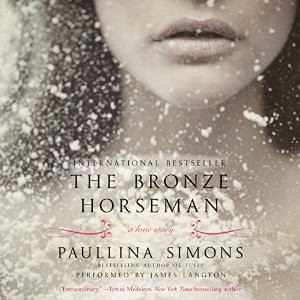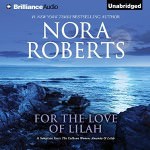 Narrated by James Langton
Narrated by James Langton
At more than 30 hours long, The Bronze Horseman is a big audio commitment. It’s not quite Outlander level but it’s getting there. Fortunately, what both books have in common is an excellent narrator (though, not the same narrator) and that makes the time pass so much more easily.
I’m not entirely sure how to describe the book. It’s not a romance as it doesn’t fit within genre requirements (that’s a hint). It’s definitely romantic. It’s also grim, melodramatic (almost soap operatic at times – the only things missing were an amnesia plot and perhaps demonic possession) and nonetheless compulsive listening.
The epic love story of Tatiana and Alexander is told over the course of three books (that’s another hint) so the entire tale, even as long as this book is, is not finished here. The Bronze Horseman covers the period from 1941 to 1943 and commences on 22 June 1941, the day that Hitler breaks the non-aggression pact with Stalin and WWII comes to the USSR. It is also the same day not-quite-17-year-old Tatiana Metanova meets a soldier in the Red Army, Alexander Belov, and is instantly smitten.
The path for Alexander and Tatiana is by no means smooth. First, it turns out that Dasha, Tatiana’s 24-year-old sister, is in love with Alexander too. Pre-Tatiana, Alexander was a bit of manslut and Dasha met him at a nightclub and they hooked up. Tatiana refuses to put her own happiness above that of her sister’s and therefore for much of the book, Alexander is Dasha’s boyfriend and not Tatiana’s. I found this hard to relate to. Alexander clearly has deep feelings for Tatiana. I didn’t understand how he could bone Dasha and five minutes either side of the event be looking longingly at Tatiana. I still don’t understand it. It felt distasteful.
Honestly, there were quite a few times where I questioned Alexander’s role as “hero” given he was banging Tatiana’s sister. I was expecting, at the very least, an EPIC grovel.
There is some Alexander POV but not a lot of it and, it is quite late in the piece where Alexander actually addresses his motivations regarding the sister-banging. I can’t say that I was happy about it even then but I do accept that Alexander’s actions late in the book balanced out the scales and left him on the right side of the hero line. (I’m still not happy about it though.)
Alexander has a complicated history which places him at extreme risk in the USSR and his “friend” Dmitri is the only person (other than Tatiana) who knows the truth of who he is. Dmitri is interested in Tatiana and threatens to reveal his knowledge to the authorities should Alexander not fall in with his plans. Needless to say, Dmitri is a jerk (understatement).
Tatiana and her family, comprised of twin brother, older sister, mother, father, grandparents and a cousin, struggle for survival through the siege of Leningrad. As the ration allowances become smaller and smaller the more tightly Hitler tightens the blockade around the city, the war takes a terrible toll on Tatiana’s family.
Added to the stresses of the siege, Tatiana’s family aren’t very nice to her. They take advantage of her good nature and are pretty much always selfish and horrible to her. This is where the soap-opera feel of the story was most obvious (well, apart from the “in love with her sister’s boyfriend” thing which, let’s face it, is straight out of Days of Our Lives). It wasn’t enough that her family was starving – they also had to treat her like a slave of dubious value. It was Alexander’s influence which largely enabled the family to survive as long as they did (he also provided practical help such as extra rations) and even though there was that sister banging, he did stick up for Tatiana when no-one else did. Tatiana’s constant selflessness, generosity and servility, in the face of everyone’s penchant for taking advantage of her were things which grated as I listened.
It’s a long book so there is obviously far more to the plot but I don’t have space here to get into it. I will say that over the course of the book, the initial barriers to Tatiana’s and Alexander’s happiness together are removed but new, and perhaps even more impossible-seeming ones, are raised. (That’s another hint.)
The narration was both excellent and somewhat curious. I haven’t heard Mr. Langton perform before but I hope to listen to more of his work (preferably in the romance genre) because he portrays wonderfully convincing females and has a vast array of character voices in his repertoire. His delivery of the emotion and tension of the story was stellar and when the grim was threatening to ruin me, his performance alone created sufficient impetus for me to continue. I’m sure his performance tipped The Bronze Horseman into compulsive listening territory.
But it was also curious. Alexander is not actually Russian (we find this out very early in the book so it is not a spoiler). He is described as having a “faint accent” which identified him to Tatiana as not being from Leningrad but his Russian is flawless. He and his parents emigrated to the USSR when Alexander was 11. He was born in Massachusetts to an American father and an Italian mother. Why then, was he given a Scottish accent in the narration?
When Alexander speaks English to Tatiana (this only happens occasionally in the story) he, for the most part, sounds American. I wondered if this was a deliberate choice to differentiate for the listener when Alexander was speaking Russian or English?
Similarly, Tatiana only had a Russian accent when she was speaking English. When she was speaking Russian, she sounded British. All the characters did, except for some American characters late in the book (one of whom sounded Scottish as well sometimes. More on that later.) Dmitri had a rougher, more working class, British accent, for example – there were a wide variety of English accents used, but none of the Russian characters sounded Russian.
Strangely, this ended up working for me because the story uses a lot of idioms which felt to me to be more strongly associated with America or Britain. I think if I had heard them used in a Russian accent, it would have felt glaringly wrong. But, as it was, hearing those metaphors and clichés used in a British accent, it felt oddly authentic. Weird, huh?
I thought that Alexander’s Scottish accent was meant to differentiate between an American speaking Russian and an American speaking English (when the US accent was used) but actually this wasn’t consistently the case. Maybe Mr. Langton just can’t keep a US accent up for any length of time? Dr Matthew Sayers, a character who assists Tatiana and Alexander late in the book, sounded similarly Scottish the longer he talked when he was speaking US English.
Consistently, all the Russian words and names were pronounced with a Russian accent though, just to throw some extra contrary into the mix.
There are happy spots in the tale but it is almost unrelentingly grim, the payoff for which doesn’t happen in this book (that’s another hint) but the narration, for all my curiosities about it, was so very entertaining, I was hooked. Can I manage the rest of the series though? I want to know what happens but there is, apparently, a lot more grim to go yet. Dammit.
Kaetrin
Narration: A
Book Content: B
Steam Factor: Glad I had my earbuds in
Violence Rating: Fighting, depictions of war
Genre: Historical Fiction
Publisher: Harper Audio
The Bronze Horseman was provided to AudioGals by Harper Audio for a review.
[jwl-utmce-widget id=32435]



Great review – I can imagine it was a nightmare to write! James Langton is one of my favourite narrators. He hasn’t recorded a huge number of romances, but I enjoyed Grace Burrowes’ Victorian-set MacGregor series (in which Mr L makes the most of that sexy Scottish accent of his!), and his recording of Julia Quinn’s Happy Ever After. Also, he’s recording the first three books in Grace Burrowes’ Windham series and I think the first of those comes out in May.
I don’t think I’ve ever tried a Burrowes book. Maybe I’ll check them out.
I really like her stuff, although I know people who don’t get on with her books. She’s a bit quirky and has a very distinctive writing style, but she can pack an emotional punch. My favourite of that trilogy is Once Upon a Tartan (which is the middle book – I reviewed it here somewhere I think). Darius which is the first book in her Lonely Lords series is also available, and as it’s the first book, there’s no previous storyline to pick up on.